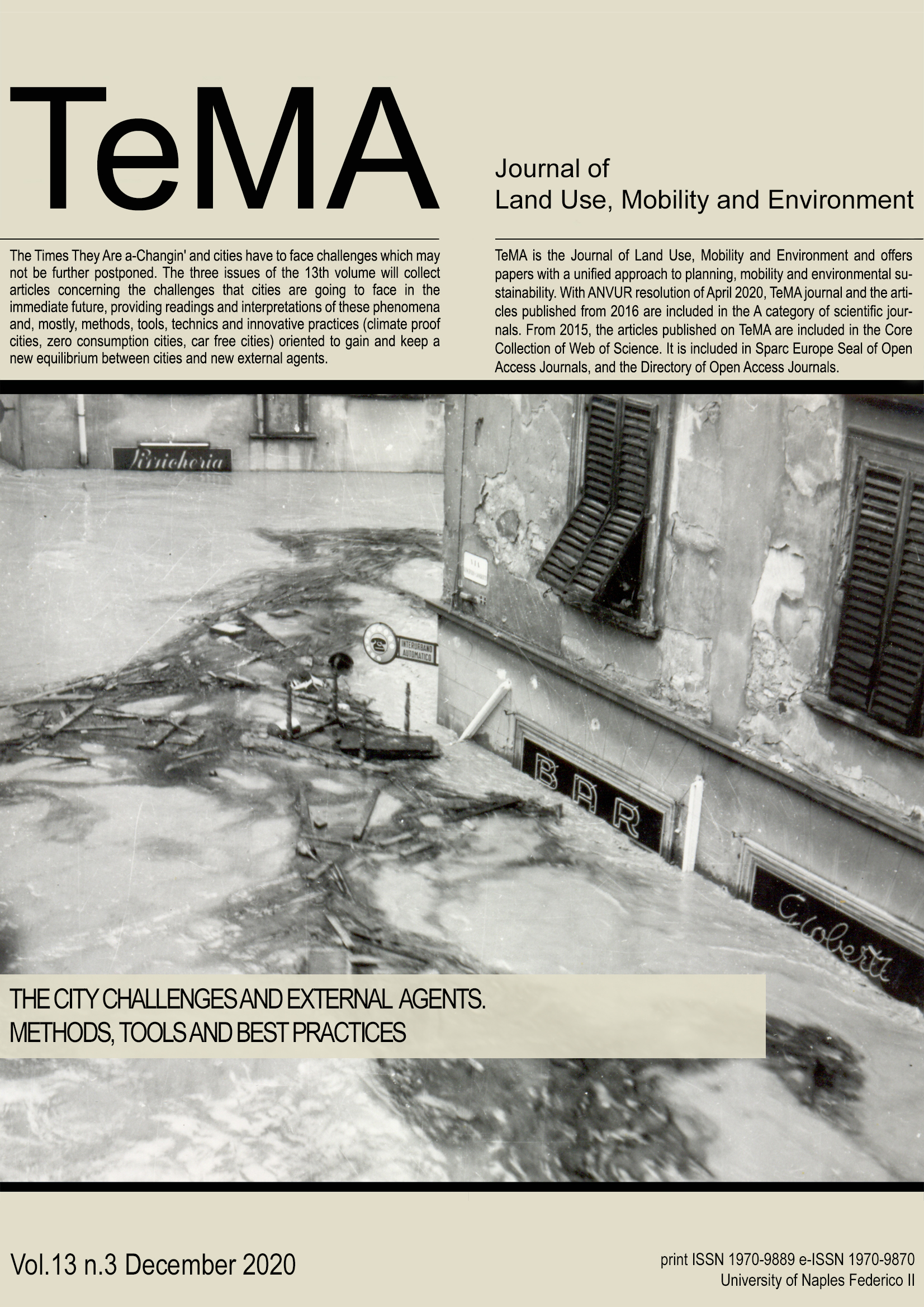After recovery: new urban emergencies
Abstract
Starting from the relationship between urban planning and mobility management, TeMA has gradually expanded the view of the covered topics, always remaining in the groove of rigorous scientific in-depth analysis. This section of the Journal, Review Notes, is the expression of a continuous updating of emerging topics concerning relationships between urban planning, mobility and environment, through a collection of short scientific papers written by young researchers. The Review Notes are made of four parts. Each sections examines a specific aspect of the broader information storage within the main interests of TeMA Journal. In particular, the Urban planning literature review section aims at presenting recent books and journals, within global scientific panorama, on selected topics and issues. This contribution aims at discussing the main impacts and consequences of the Covid-19 pandemic on our lives and urban systems. While for the last issue of TeMA, this section of the journal was dedicated to the emergency phase, according to the new policy and strategic actions aimed at improving the coexistence of the new coronavirus within urban environments, this contribution is focused on how policy makers can enhance urban resilience, in sight of potential new health crisis.
Downloads
References
Bouffanais, R., & Lim, S. S. (2020). Cities—Try to predict superspreading hotspots for Covid-19. Nature, 583, 352-355. Retrieved from: https://media.nature.com/original/magazine-assets/d41586-020-02072-3/d41586-020-02072-3.pdf
Bottero, M., Mondini, G., & Datola, G. (2017). Decision-making tools for urban regeneration processes: from Stakeholders Analysis to Stated Preference Methods. TeMA - Journal of Land Use, Mobility and Environment, 10 (2), 193-212. https://doi.org/10.6092/1970-9870/5163
Carpentieri, G. (2020). La smartness e la competitività della città resiliente. Sfide e minacce per le città del ventunesimo secolo. (Vol. 6). FedOA-Federico II University Press. https://doi.org/10.6093/978-88-6887-088-1
Gargiulo, C., Gaglione, F., Guida, C., Papa, R., Zucaro, F., & Carpentieri, G. (2020). The role of the urban settlement system in the spread of Covid-19 pandemic. The Italian case. TeMA - Journal of Land Use, Mobility and Environment, 189-212. https://doi.org/10.6092/1970-9870/6864
Guida, C. (2020). After recovery: towards resilience. TeMA - Journal of Land Use, Mobility and Environment, 13 (2), 259-264. https://doi.org/10.6092/1970-9870/7046
Guida, C., & Carpentieri, G. (2020). Quality of life in the urban environment and primary health services for the elderly during the Covid-19 pandemic: An application to the city of Milan (Italy). Cities, 103038. https://doi.org/10.1016/j.cities.2020.103038
Howard-Jones, N. (1975). The scientific background of the International Sanitary Conferences, 1851-1938. World Health Organization, Geneva.
Patel, A., & Shah, P. (2020). Rethinking slums, cities, and urban planning: lessons from the Covid-19 pandemic. Cities & Health, 1-3. https://doi.org/10.1080/23748834.2020.1790252
Wallace, D., & Wallace, R. Covid-19 in New York City An Ecology of Race and Class Oppression. Springer Nature Switzerland. ISBN: 978-3-030-59623-1. https://doi.org/10.1007/978-3-030-59624-8
World Bank. (2020). Global Outlook: Pandemic, Recession: The Global Economy in Crisis. World bank, Washington D.C., United States of America. ISBN: 978-1-4648-1553-9
Copyright (c) 2020 TeMA - Journal of Land Use, Mobility and Environment

This work is licensed under a Creative Commons Attribution 4.0 International License.
Authors who publish in this journal agree to the following:
1. Authors retain the rights to their work and give in to the journal the right of first publication of the work simultaneously licensed under a Creative Commons License - Attribution that allows others to share the work indicating the authorship and the initial publication in this journal.
2. Authors can adhere to other agreements of non-exclusive license for the distribution of the published version of the work (ex. To deposit it in an institutional repository or to publish it in a monography), provided to indicate that the document was first published in this journal.
3. Authors can distribute their work online (ex. In institutional repositories or in their website) prior to and during the submission process, as it can lead to productive exchanges and it can increase the quotations of the published work (See The Effect of Open Access)

